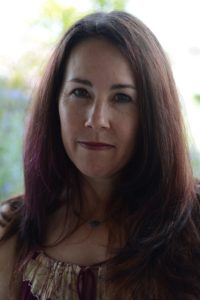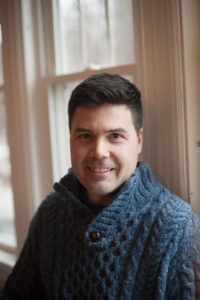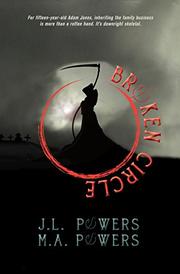Giving Kids a Break: What’s so normal about “normal”? Or, in other words, is it OK to be “average”?
A few years ago, I started writing books with my “little” brother (he’s younger but much taller…and a whole lot cooler!).
Broken Circle is the first book in a series that examines cultural concepts of death through teen characters who serve as “soul guides”—that is, the entities charged with ushering recently departed souls from this world to the next. Modern day Charons, rowing patrons across the River Styx. Each teen soul guide belongs to a particular family of psychopomps—from the Reaper family to the Angel of Death family to the La Muerte family, etc. And each soul guide teen brings to the table a little bit of cultural reference in how they understand death and the process of dying. In the first book, however, our main character 15-year-old Adam doesn’t even realize that he’s a soul guide. He doesn’t know that his father is the Grim Reaper and he’s about to inherit the family business.
When I called Matt to talk about writing this blog post, we spent some time trying to figure out what we could say that would be useful to teachers and readers. After all, “death” is not an everyday topic for teachers! (As an aside, maybe it should be. We all die someday….shouldn’t we prepare for it rather than avoid it? That is, by the way, part of the impetus for writing this book…. The series is an extended philosophical meditation about death via fast-paced fantasy novels. Why, as a culture, are we so afraid of something we all must do someday?)
As we thought about this, we explored the following questions: Why did we write this book about a kid who’s just trying to live a so-called “normal” life and who discovers that he’s anything but normal—that he is, in fact, the personification of something everybody fears? How would he cope with that? How should we, as people, cope with the way other people perceive us or the ways we feel we aren’t “normal”? Can the things we fear most become our friend? Can we learn to embrace what is “abnormal” because it is healthier for us than what is “normal”?
Matt and I did not grow up “normal,” although it certainly felt “normal” to us because it was what we knew. We lived in a neighborhood on the U.S.-Mexico border, where half our neighbors and friends were “undocumented” immigrants, and many of them refugees fleeing the violence of Central America. Our mother homeschooled us before homeschooling was trendy—in fact, for the first few years, we kept it secret because the state of Texas was actively prosecuting parents who were homeschooling. My parents always tried to stay out of debt so we drove old clunkers, like the 1972 sky-blue Montego that embarrassed us so much whenever we went to church, where other families drove nice cars. (In our neighborhood, though, that 1972 Montego was COOL….low-rider material!) We wore hand-me-down clothes. Our mom cut our hair. We lived in a decrepit old perpetually-remodeling house. We were the antithesis of cool.
Today, both Matt and I are live on opposite sides of the country—Matt in Maine and me in California, the “Left Coast.” We are both trying—hard—not to get caught up in what our current culture regards as “normal,” whether that’s the most recent trend or the rat race of trying to keep up with the Joneses. Of trying to live up to some standard of what others deem “success.” And one of the things that worries both of us about modern childhood is the extreme stress society and families place on kids in order to make them achieve some predetermined notion of “success.” From preschool to college, we expect not just perfection in grades and school but we seem to pressure our kids to fill every moment of their lives with some activity that will help them “achieve” some undetermined level of greatness. It’s not enough to just enjoy soccer—you have to be so good at soccer that you can earn a scholarship. It’s not enough just to enjoy karate—you need to earn a black belt. And so on and so forth. It’s a terrible cycle that never ends—and to what purpose? What are our kids supposed to achieve? Couldn’t it be enough to live a good life, fall in love (or not), go to a “mediocre” school (is it really necessary to go to Yale?) or learn a trade, have kids (or not), travel a little bit, and generally be happy?
“We need T-shirts,” Matt said, “that say, ‘Celebrating the Average!’”
This doesn’t mean, by the way, that we think people and kids shouldn’t strive to achieve their dreams—only that our modern vision of what that should look like or how to get there is fundamentally problematic.
In Broken Circle, Adam is forced to leave his regular public school and attend a special boarding school. There will be no college for him, so this isn’t an expensive prep school designed to get him into Harvard or Yale. Instead, he must learn the skills necessary to help newly departed souls cross a world we named “Limbo” to reach the “other side.”
And what are those skills exactly? What does Adam need to know in order to fulfill the obligations of this very different kind of profession?
Actually, he doesn’t need to KNOW anything. But he does need a skill set, one we think all people would benefit from.
In the world of Broken Circle, each departed soul enters a world called “Limbo.” If they don’t pass through Limbo to the other side, they remain stuck in Limbo forever. Limbo, as we constructed it, is a world each person experiences differently. It represents the emotional apex of a person’s life—their obsessions or fears or loves or desires. A soul guide must help each soul solve the problem of their life so they can pass peacefully on. So for example, a person who has spent much of his life pushed and pulled between the competing whims of a manipulative parent or spouse may have to endure a monstrous exaggeration of that world in Limbo and learn to stand up for himself before he can pass on to the other side. Or a mathematician might find herself stuck in a difficult, seemingly impossible math equation that she must solve. Or a librarian might find himself facing a stack of books he must shelve but they all lack their Dewey classification numbers. Or an electrician faces a live wire and a body of water she must somehow cross. You get the point…
These soul guides can’t possibly “know” everything they need in order to do this job! How do you prepare for something that is impossible to prepare for? Every soul these teens will guide across Limbo will have a different world they must navigate—a different emotional or literal problem they must solve. As a result, at the School for Soul Guides, these teens are allowed to learn whatever interests them. If they want to cook, they can learn to cook. If they want to learn karate, learn karate. If they want to build a pyramid, let them build a pyramid—figuring out mathematical proportions, soldering, and everything else required to create a pyramid. School in this case isn’t made up of required subjects that they have to master. They don’t all need to progress through rote systems of knowledge. Instead, whatever interests them, they pursue.
In our book, a soul guide in training must learn skills that helps them adapt to different situations and different people’s needs. A soul guide must learn how to be a good friend and mentor so he or she can help souls navigate the complexity of their emotional world. In other words, a “good” soul guide is one who is curious, flexible, judicious, and non-judgmental.
In the end, as teachers and parents, what are the skills we should impart to our kids to prepare them for a rapidly changing world? Do we need them to be so stressed, to cram every minute full of learning? Is it knowledge they need—or something else? Can we give them more space and time to grow as people in these fundamentally necessary skills of curiosity, flexibility, sagacity, and acceptance of others?
In the book, when he realizes that he is allowed to learn whatever he wants and nobody will stand in his way by requiring him to learn something else, one of our characters jokes, “Are we becoming jacks of all trades, masters of none?” The answer is no. They are learning to pursue learning for the sake of learning. They are learning to be people.
I have spent twenty years teaching college English. Yes, I like my students to be better writers, thinkers, and readers when they leave my classroom. But more important than that , I hope that when they leave my classroom, they have grown as people….that they have become better, kinder citizens of an increasingly globalized world. In my students and my own kid, and especially in myself, I hope I celebrate this kind of growth rather than cultural and financial and educational markers of “success”…..
J.L. POWERS is the award-winning author of three young adult novels, The Confessional, This Thing Called the Future, and Amina. She is also the editor of two collections of essays and author of a picture book, Colors of the Wind. She works as an editor/publicist for Cinco Puntos Press, and is founder and editor of the online blog, The Pirate Tree: Social Justice and Children’s Literature. She teaches creative writing, literature, and composition at Skyline College in California’s Bay Area, served as a jurist for the 2014 NSK Neustadt Prize for Children’s Literature, and is launching Catalyst Press in 2017 to publish African writers.
M.A. POWERS is J.L.’s “little” (but much taller) brother. He has a PhD in the oncological sciences from the Huntsman Cancer Institute at the University of Utah in Salt Lake City. He is currently a stay-at-home dad and lives in Maine.
For young Adam Jones, inheriting the family business is more than a rotten hand. It’s downright skeletal.
PRAISE FOR BROKEN CIRCLE
“Adam’s ‘nightmares’ are so amped up that they begin to reveal to him truths about his parentage, and the mantle that has been placed upon his shoulders by his father, a grim reaper. There are so many other questions he wants answered and consequentially, he is shipped off to a ‘rehab’ which is actually the citadel for ‘soul guides.’ Teen and adult fans of the Sookie Stackhouse novels and the Mortal Instruments [series] will find Broken Circle a tight competitor for the new most addictive paranormal read.”
—Jilleen More, Square Books (Oxford, MS)
“Adam can’t even grow a man beard yet, but he can do something his friends can’t do—go to Limbo and back. Prepare to root for him as he makes new friends, discovers who he is, and saves a few souls in the process. This is a fast-paced, page-turning story!”
—Skila Brown, author of Caminar
“With a perfect balance of real-world and mythical, Adam’s story explores life, death, and everything in between. Anyone looking for a thoughtful take on life’s big questions will find it here, paired with fresh details, a fastmoving story, and bold world building.”
—Amy Rose Capetta, author of Entangled
ABOUT BROKEN CIRCLE
Adam wants nothing more than to be a “normal” teen, but his reality is quickly leaking normal. Afraid to sleep because of the monster that stalks him in his dreams, Adam’s breakdown at school in front of his crush Sarah lands him in the hospital. As he struggles to cope with his day-to-day life, Adam can only vaguely comprehend some sort of future. His mother died when he was only four and his eccentric father—who might be an assassin, a voodoo god, the reincarnation of the Buddha, or something even stranger—is never available when Adam really needs him. Even his paranoid grandfather, who insists that people are “out to kill the entire family,” is no help.
Adam’s life takes an even stranger turn when a fat man with a gold tooth and a medallion confronts his father regarding Adam’s supposed “True Destiny.” Adam is soon headed toward a collision with life, death, and the entities charged with shepherding souls of the newly dead, all competing to control lucrative territories where some nightmares are real and psychopomps of ancient legends walk the streets of North America.
Thank you for this guest post! It is so important for each kid to find their own path.





